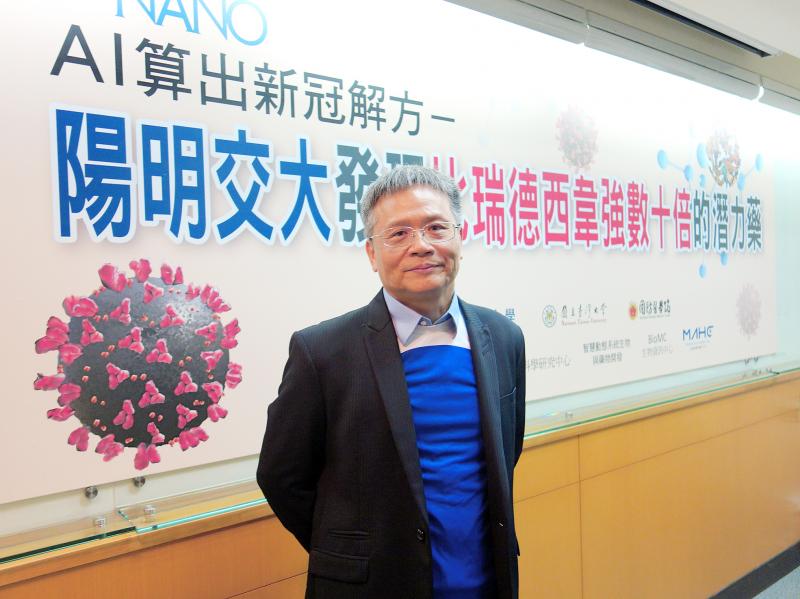National Yang Ming Chiao Tung University researchers have identified four antiviral drug candidates that can inhibit SARS-CoV-2, which causes COVID-19, the team leader said on Tuesday.
One of the drug candidates — JMY206 — is more than 10 times stronger than remdesivir, the first antiviral drug fully certified for the treatment of COVID-19, said Yang Jinn-moon (楊進木), dean of the university’s College of Biological Science and Technology.
The other drugs identified are boceprevir, an oral, direct-acting hepatitis C virus protease inhibitor; telaprevir, a hepatitis C drug; and nelfinavir, an antiretroviral drug used to treat HIV-positive patients, Yang said.

Photo: Wu Po-hsuan, Taipei Times
The team’s starting point was its understanding that SARS-CoV-2 is highly similar to the virus that causes SARS, Yang said.
It then gathered SARS-related data and screened US Food and Drug Administration-approved drugs and natural products for possible COVID-19 treatment, he said.
By using artificial intelligence and big data, the team created simulations of changes in cell mechanisms after SARS-CoV-2 entered human host cells, and compared them with 250 globally published images of the 3D architecture of the main protease of the virus.
That resulted in the identification of six possible structures of key proteases — the enzymes that break down proteins and could lead to disease — that are essential for promoting SARS-CoV-2 entry, Yang said.
The team then identified the drugs that could inhibit the proteases and eventually SARS-CoV-2.
The most potent of the drugs, JMY206, can inhibit SARS-CoV-2 from entering cells, the team said.
The therapeutic benefits of JMY206 have also been proven in animal experiments and it can be a potential oral drug against COVID-19, Yang said.
The team has applied for a patent, and is planning to publish a paper on its findings and develop medicines by combining other medicinal components, Yang added.

Taiwan is stepping up plans to create self-sufficient supply chains for combat drones and increase foreign orders from the US to counter China’s numerical superiority, a defense official said on Saturday. Commenting on condition of anonymity, the official said the nation’s armed forces are in agreement with US Admiral Samuel Paparo’s assessment that Taiwan’s military must be prepared to turn the nation’s waters into a “hellscape” for the Chinese People’s Liberation Army (PLA). Paparo, the commander of the US Indo-Pacific Command, reiterated the concept during a Congressional hearing in Washington on Wednesday. He first coined the term in a security conference last

Prosecutors today declined to say who was questioned regarding alleged forgery on petitions to recall Democratic Progressive Party (DPP) legislators, after Chinese-language media earlier reported that members of the Chinese Nationalist Party (KMT) Youth League were brought in for questioning. The Ministry of Justice Investigation Bureau confirmed that two people had been questioned, but did not disclose any further information about the ongoing investigation. KMT Youth League members Lee Hsiao-liang (李孝亮) and Liu Szu-yin (劉思吟) — who are leading the effort to recall DPP caucus chief executive Rosalia Wu (吳思瑤) and Legislator Wu Pei-yi (吳沛憶) — both posted on Facebook saying: “I

Sung Chien-liang (宋建樑), who led efforts to recall Democratic Progressive Party (DPP) Legislator Lee Kun-cheng (李坤城), was released on bail of NT$80,000 today amid outcry over his decision to wear a Nazi armband to questioning the night before. Sung arrived at the New Taipei District Prosecutors’ Office for questioning in a recall petition forgery case last night wearing a red armband bearing a swastika, carrying a copy of Adolf Hitler’s Mein Kampf and giving a Nazi salute. Sung left the building at 1:15am without the armband and covering the book with his coat. Lee said today that this is a serious

The Ministry of Economic Affairs has fined Taobao NT$1.2 million (US$36,912) for advertisements that exceed its approved business scope, requiring the Chinese e-commerce platform to make corrections in the first half of this year or its license may be revoked. Lawmakers have called for stricter enforcement of Chinese e-commerce platforms and measures to prevent China from laundering its goods through Taiwan in response to US President Donald Trump’s heavy tariffs on China. The Legislative Yuan’s Finance Committee met today to discuss policies to prevent China from dumping goods in Taiwan, inviting government agencies to report. Democratic Progressive Party Legislator Kuo Kuo-wen (郭國文) said